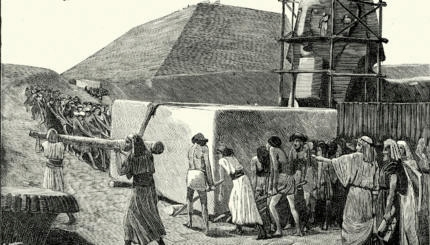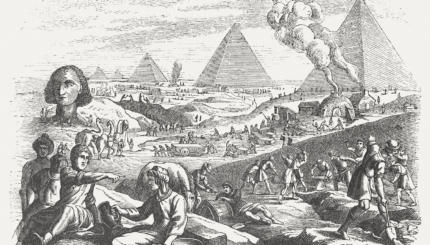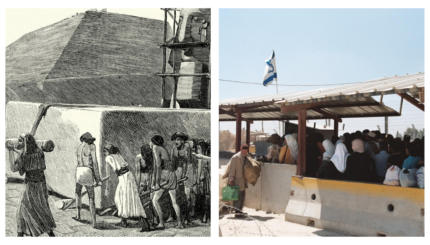Freedom is not taken away abruptly; it is eroded slowly. We not only see this in our current political reality here in the United States and abroad, but we see this in the Torah, with the beginning of the Book of Exodus and the Passover story.
The Book of Exodus, or in Hebrew, Sefer Shemot, is best translated as “The Book of Names”. It aptly begins with the following words: “These are the names of the sons of Israel who came to Egypt with Jacob”. Yet after naming Joseph and Joseph’s brothers as the specific Israelite families in Egypt, Bible Scholar Aviva Zornberg points out that Israelite names disappear from the text entirely. This new anonymity helps create the conditions for the Israelites’ eventual enslavement: the new Pharaoh is thus able to render the people of Israel a distant, suspicious group, apart from their Egyptian neighbors. He makes them an object of fear, a group that must be set apart and controlled for the safety of the Egyptians.
This narrative is frighteningly close to the narrative of the opponents of transgender non-discrimination laws in our country. They say that transgender folks are not people with names, not people to know and understand, but a group to be feared. That their presence in our bathrooms is unsafe, so they must be kept out. So what if that keeps transgender folks out of public life? So what if it curbs their freedom of movement and access in the towns and cities where they live?
In the Passover story, Pharaoh does not simply overtake the Israelites with his military, he deals “shrewdly” with them (Exodus 1:10), gradually undermining their freedom and turning them into his slaves. Midrash Tanchuma describes this gradual process of enslavement: Pharaoh himself began to build new cities, and took a basket and shovel and went to work, and all who saw Pharaoh do this did likewise. The Israelites came too, and diligently worked with him all day, alongside their Egyptian neighbors. Yet when evening fell, Pharaoh placed taskmasters over the Israelites, and said to them “Count how many bricks [the Israelites] made…This number you shall deliver to me each and every day.”
This sort of shrewdness underlies the efforts of our opponents, who are currently pursuing strategies to chip away at protections for transgender folks across the country and to roll back the LGBTQ movement’s gains. Across the country, states are considering bills that would preempt the possibility of transgender non-discrimination laws, enshrine religious freedom as a value that condones hatred and discrimination, and repeal non-discrimination laws. One such effort is happening right here in Massachusetts.
On November 6th, there will be a question on the Massachusetts ballot to take away the hard-won rights of transgender members of the Commonwealth to fair and equal treatment in public spaces. This repeal of public accommodation is not about safety, as our opponents suggest, but is about creating a society of hatred and human indignity.
As a Jew who is deeply connected to Judaism and to transgender folks, I cannot stand by and let this hatred and discrimination prevail. Our tradition speaks clearly on this matter: We are obligated to ensure the full humanity of all people. Human beings have inherent dignity, and we have a responsibility to create a world that enshrines this. And as someone connected to many transgender folks, I cannot watch as my society fails them, and really all of us, at every turn. It simply is not right.
This is why I invite you to join in Keshet’s efforts to help defeat this ballot initiative. We are working with the Freedom for All Massachusetts campaign to raise awareness about this ballot initiative in the Jewish community, engage voters, and commit as Jews to vote to protect the rights of our transgender community.
Email me if you would like to get involved or get your synagogue or Jewish organization involved with Keshet’s and Freedom for All Massachusetts’ efforts.
The Chassidic Masters teach that the Exodus from Egypt was not an experience of the past, but is an ever-present experience in our lives. This may mean that we will always have battles of liberation to fight. But it could also mean that no matter the reality we find ourselves in, we must always understand that our freedom from oppression is inevitable. It will take work to defeat this ballot initiative this November, but we will win. And we will do so only with your help. We hope you will join us.
Additional Resources and Texts:
Opponents of non-discrimination laws are currently pursuing strategies to chip away at protections for the LGBTQ community and undermine the movement’s gains. What’s happening in MA is only one such effort.
https://www.freedomforallamericans.org/2018-legislative-tracker/legislative-tracker-local-control-bills/ (this shows all the statewide legislative efforts to roll back LGBTQ non-discrimination)
https://www.freedomforallamericans.org/category/resources/
Let us deal wisely with them (1:10)
(Midrash Tanchuma)
(10) “Let us scheme against them” Pharaoh and his advisers did not decide to smite them with the sword, because that would be a great betrayal, to smite a nation that has come to the land on the command of the first king. Even the common people wouldn’t give consent to the king to do such a crime, for he advises with them, and additionally the nation of Israel was numerous and mighty and would fight back in a great war. Rather he advised that they should act cleverly so that Israel should not feel that he is acting out of hate, and therefore he levied a tax on them, for it is common for foreigners to pay a tax to the king, as is seen by Solomon (Kings 1, 9:21)
וַיָּמָת יוֹסֵף וְכָל אֶחָיו, וְאַף עַל פִּי כֵן וּבְנֵי יִשְׂרָאֵל פָּרוּ וַיִּשְׁרְצוּ. רַבִּי יַנַּאי אוֹמֵר: כָּל אַחַת וְאַחַת יוֹלֶדֶת שִׁשָּׁה בְּכֶרֶס אֶחָת. וְיֵשׁ אוֹמְרִים: שְׁנֵים עָשָׂר, דִּכְתִיב: ‘פָּרוּ’, שְׁנַיִם, ‘וַיִּשְׁרְצוּ’, שְׁנַיִם, ‘וַיִּרְבּוּ’, שְׁנַיִם, ‘וַיַּעַצְמוּ’, שְׁנַיִם, ‘בִּמְאֹד מְאֹד’, שְׁנַיִם, ‘וַתִּמָּלֵא הָאָרֶץ אֹתָם’, הָא שְׁנֵים עָשָׂר. וְרַבִּי יוֹנָתָן אָמַר: וַתִּמָּלֵא הָאָרֶץ אֹתָם, מִלְאוּ אֶת הָאָרֶץ כֶּחֳרָשִׁים שֶׁל קָנִים. כֵּיוָן שֶׁרָאוּ הַמִּצְרִים כָּךְ, חִדְּשׁוּ עֲלֵיהֶן גְּזֵרוֹת, שֶׁנֶּאֱמַר: וַיָּקָם מֶלֶךְ חָדָשׁ. וְכִי חָדָשׁ, וַהֲלֹא הוּא פַּרְעֹה? אֶלָּא שֶׁאָמְרוּ לוֹ הַמִּצְרִים: בּוֹא וְנִזְדַּוֵּג לְאֻמָּה זוֹ. אָמַר לָהֶן: שׁוֹטִים, עַד עַכְשָׁיו אָנוּ חַיִּים מִשֶּׁלָּהֶם, וְהֵיאַךְ נִזְדַּוֵּג לָהֶן עַכְשָׁו. אִלּוּלֵי יוֹסֵף לֹא הָיָה לָנוּ חַיִּים. כֵּיוָן שֶׁלֹּא שָׁמַע לָהֶם, הוֹרִידוּהוּ מִכִּסְאוֹ שְׁלֹשָה חֳדָשִׁים, עַד שֶׁאָמַר לָהֶם: כָּל מַה שֶּׁאַתֶּם עוֹשִׂין הֲרֵינִי עִמָּכֶם, וְהֶעֱמִידוּהוּ. לְפִיכָךְ כְּתִיב וַיָּקָם מֶלֶךְ חָדָשׁ.
And Joseph died, and all his brethren (Exod. 1:6). Nevertheless, the children of Israel were fruitful and increased abundantly (ibid., v. 7). R. Yannai declared: Each woman bore six children at one time, while (because each word in the biblical verse is in the plural form, thus implying a minimum of two) others say that each one bore twelve, for the word paru (“were fruitful”) indicates two; vayishresu (“and increased abundantly”), two; vayirbu (“and multiplied”), two; vaya’asmu (“and waxed”), two; bime’od me’od(“exceeding mighty”), two; and the land was filled with them (ibid.), two, totaling twelve in all. R. Jonathan said: The land was filled with themimplies that they filled the land like reed branches. When the Egyptians observed this, they issued new decrees against them, as it is said: Now there arose a new king (Exod. 1:8). Was he in fact a new king? Rather, he fashioned new decrees against them. Another explanation of Now there arose a new king. Was it not Pharaoh? Rather, the Egyptians cried out: “Come, let us attack this nation.” “You fools,” he said to them, “we have survived only because of them, how dare we attack them now? Were it not for Joseph, we would not be alive.” When he refused to carry out their request, they removed him from his throne for three months until he promised them: “I am with you in all you do.” Then they restored him to his throne. That is why it is written: And now there arose a new king.
(Midrash Tanchuma, Shemot 5)



